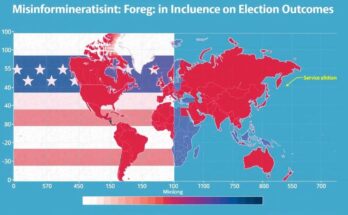Following post-election violence in Mozambique, which resulted in over 100 deaths, Zimbabwe’s President Emmerson Mnangagwa announced SADC’s readiness to assist. South Africa’s government also called for urgent dialogue to address the unrest stemming from electoral disputes. Advocates for peace emphasize that dialogue is crucial for restoring stability and opening key economic channels that have been disrupted by ongoing conflicts.
Zimbabwe’s President Emmerson Mnangagwa, currently chairing the Southern African Development Community (SADC), has expressed the bloc’s readiness to assist Mozambique as it grapples with severe post-election violence. This unrest, triggered by allegations of electoral fraud regarding the October 9 elections, has led to over 100 fatalities among protesters, according to reports from human rights organizations. President Mnangagwa emphasized the urgent need to end this violence following the ruling by Mozambique’s Constitutional Council awarding a decisive victory to the Frelimo party.
Amidst this turmoil, South African Minister for International Relations and Cooperation, Ronald Lomola, underscored the importance of dialogue for resolving the crisis and offered South Africa’s assistance in facilitating such discussions. Additionally, Venancio Mondlane, the opposition leader, highlighted the plight of citizens affected by Frelimo’s actions, calling for solidarity among the populace to address broader issues of change within the country.
Khanyo Farise from Amnesty International condemned the government’s response to the protests, characterizing it as one of the most severe crackdowns on civil rights in recent history. Farise documented the excessive use of force by police, which has resulted in numerous injuries and fatalities among civilians. Researcher Borges Nhamirre emphasized the critical need for dialogue to restore peace in Mozambique, as the ongoing crisis has severely impacted economic activities, including the closure of key ports serving neighboring nations.
In light of these developments, the collective calls for peace from both the opposition and regional entities signal a potential turning point in addressing the unrest and consequently restoring stability in Mozambique.
The political landscape in Mozambique has been tumultuous following the October 9 elections, during which the ruling Frelimo party claimed a significant victory amidst accusations of electoral misconduct from opposition factions. These allegations have sparked widespread protests, leading to violent confrontations with law enforcement. With increasing fatalities reported and a growing international outcry for accountability and dialogue, the situation has gained the attention of neighboring countries and regional organizations, particularly the SADC and the African Union, which are now advocating for peaceful resolutions and human rights protection.
The situation in Mozambique following the recent elections underscores the urgent need for dialogue and peaceful conflict resolution. With a significant loss of life and rising socioeconomic challenges, the voices of opposition leaders, human rights advocates, and regional allies all point towards a collective effort to stabilize the nation. The commitment from SADC and neighboring countries to support these efforts reflects a shared responsibility in fostering democratic principles and human rights in the region, aiming to mend social divides and restore order.
Original Source: www.voanews.com




